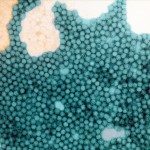Lien vers Pubmed [PMID] – 40916768
Lien DOI – 10.1093/trstmh/traf090
Trans R Soc Trop Med Hyg 2025 Sep; ():
In 2023, Mayotte, a French department in the Mozambique channel, experienced a long drought that led to potable water restrictions. Although the French vaccination schedule makes polio vaccination compulsory for children, the large proportion of migrants on the island coupled with the water crisis raised concerns about the establishment of poliovirus transmission chains. Therefore, a surveillance was implemented to detect polioviruses in sewage sampled in the two main wastewater treatment plants.Samples collected from September 2023 through January 2024 were processed following the Global Polio Laboratory Network’s algorithm.Only two polioviruses were detected, both featuring a low number of nucleotide differences compared with vaccine strains, which suggested excretion by recently vaccinated people rather than circulation. The surveillance revealed viruses of the species Cardiovirus rueckerti in almost one-half of the samples. Furthermore, 305 non-polio enteroviruses were detected, belonging to various virus types of species Enterovirus betacoxsackie (53%), Enterovirus coxsackiepol (44%), and Enterovirus alphacoxsackie (3%).The poliovirus surveillance did not detect any wild or highly mutated poliovirus strains and did not highlight poliovirus circulation. This provided an opportunity to obtain the first overview of the non-polio enteroviruses circulating in Mayotte.GenBank accession numbers PQ009012-PQ009102, PQ566710-PQ566937 and PQ868249-PQ868262.




